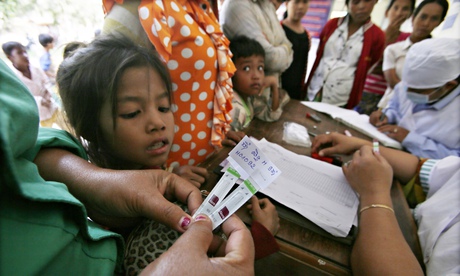Cambodia investigates suspected mass HIV infection
Unlicensed doctor suspected of spreading virus through contaminated needles, leaving 106 people thought to be infected
Agence France-Presse / The Guardian |

Cambodia’s prime minister, Hun Sen, has ordered an inquiry into an
apparent mass HIV infection believed to have been spread by contaminated
needles, as the number of suspected cases passed 100.
Hundreds of panicked residents of the remote village of Roka, in western Battambang province, have sought testing since news of the infections emerged last week, with health officials saying a total of 106 people may have contracted the virus.
“I call for a thorough investigation into the issue,” Hun Sen said in a televised speech, urging tests of the equipment used to verify that the patients have HIV.
Teams from the health ministry and the World Health Organisation (WHO) and UNAids have been at the site since Tuesday to review the alarmingly high number of positive results and offer free voluntary testing.
The health minister, Mam Bunheng, said: “I urge everyone to stay calm and avoid listening to or spreading rumours. We should also fully respect the privacy of the affected families and ensure they do not face stigma and discrimination.”
The outbreak in Roka, a village of around 800 residents, emerged in late November when a 74-year-old man tested positive at a health centre, swiftly followed by his granddaughter and son-in-law, the ministry said.
The spotlight then moved to all of the patients of an unlicensed local doctor, whom villagers suspect of spreading the virus through contaminated needles. Local media reports said the self-appointed doctor had been questioned by police.
Mean Chhi Vun, director of the health ministry’s National Centre for HIV/Aids, Dermatology and STDs, said experts were double-checking the test results. “We need to do more confirmation tests,” he said.
Cambodia has been widely hailed for its efforts in tackling HIV/Aids. The National Aids Authority says the rate of HIV infection among people aged 15 to 49 has declined from 0.6% in 2013 to 0.4% in 2014.
Cambodia estimates more than 73,000 people live with the disease. The country is aiming for a 0% HIV/Aids infection rate by 2020.
Hundreds of panicked residents of the remote village of Roka, in western Battambang province, have sought testing since news of the infections emerged last week, with health officials saying a total of 106 people may have contracted the virus.
“I call for a thorough investigation into the issue,” Hun Sen said in a televised speech, urging tests of the equipment used to verify that the patients have HIV.
Teams from the health ministry and the World Health Organisation (WHO) and UNAids have been at the site since Tuesday to review the alarmingly high number of positive results and offer free voluntary testing.
The health minister, Mam Bunheng, said: “I urge everyone to stay calm and avoid listening to or spreading rumours. We should also fully respect the privacy of the affected families and ensure they do not face stigma and discrimination.”
The outbreak in Roka, a village of around 800 residents, emerged in late November when a 74-year-old man tested positive at a health centre, swiftly followed by his granddaughter and son-in-law, the ministry said.
The spotlight then moved to all of the patients of an unlicensed local doctor, whom villagers suspect of spreading the virus through contaminated needles. Local media reports said the self-appointed doctor had been questioned by police.
Mean Chhi Vun, director of the health ministry’s National Centre for HIV/Aids, Dermatology and STDs, said experts were double-checking the test results. “We need to do more confirmation tests,” he said.
Cambodia has been widely hailed for its efforts in tackling HIV/Aids. The National Aids Authority says the rate of HIV infection among people aged 15 to 49 has declined from 0.6% in 2013 to 0.4% in 2014.
Cambodia estimates more than 73,000 people live with the disease. The country is aiming for a 0% HIV/Aids infection rate by 2020.


No comments:
Post a Comment